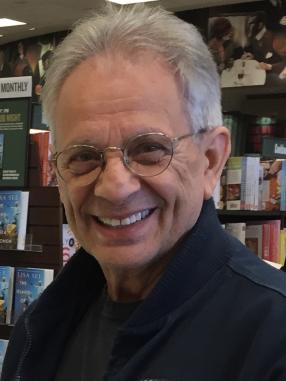
By Leslie Virostek
Author Ron Farina challenges readers to grapple with the human consequences of war and the sacrifices made by America’s veterans.
In his book "Who Will Have My Back," he shines a light on the work of caregivers to disabled veterans, including the medical professionals who manufacture protheses and help amputees learn to walk again. In "Out of the Shadows: Voices of American Women Soldiers" he draws attention to the fact that women also serve in combat roles and showcases the challenges—and the resilience—of nine women who were catastrophically wounded in the line of duty. In "Sacrifice: The Final Chapter," he lays bare the grief and loss experienced by military families.
Giving insight to the American public about the costs of war, Farina’s storytelling has also impacted veterans themselves. The latter book of the trilogy includes a profile of Marine Corporal Kelsee Lainhart, who was paralyzed from the waist down in a suicide bombing in Afghanistan, alongside a friend and fellow soldier who was killed. Farina’s depiction of Lainhart’s courage spurred a nonprofit called Sticks for Soldiers to make her the first female honoree in its 18-year history. The recognition came with life-changing financial support for the disabled veteran.
“I believe in the power of stories,” says Farina, a former marine sergeant who graduated from Central with a B.A. in Creative Nonfiction in 2015. “A good story is powerful — often more powerful than the strongest argument.”
In recognition of his work to illuminate the service and sacrifice of veterans, Farina was inducted into the Connecticut Veterans Hall of Fame in January, along with 13 others. Held in the Gold Star Memorial Auditorium of the Connecticut Veterans Affairs campus in Rocky Hill, the standing-room-only ceremony was for Farina a “very emotionally moving event.”
But rather than pride in his accomplishments and recognition, Farina feels a sense of gratitude.
He states, “I’m grateful for the opportunity to tell the stories of America’s heroes.”
How Farina became an author is itself a compelling story. It began at Central in 1965, when he left school after one semester for lack of tuition money and enlisted on the promise of the G.I. Bill. After Vietnam, Farina would find his way to a successful career as a corporate headhunter, even running his own multi-discipline executive search practice until 2009. But something was nagging at him: He’d never finished that bachelor’s degree, even though he had made a solemn promise to his fellow soldiers in Vietnam that someday he would.
So, upon retirement, he returned to Central. Until then, he’d kept thoughts of the war at bay, but he found that physically being on campus took him psychologically back in time. Painful memories of his service — of those who’d been killed, of the horrors of war — came flooding back.
Farina realized he had stories to tell, and perhaps an obligation to tell them, so he enrolled in his first writing course. That led to a life-changing encounter with Professor of English Mary Collins.
Farina vividly recalls how Collins’s corrections on his first assignment included a disheartening message in red ink at the top: The paper was unacceptable and not worthy of a grade. He should come to her office hours for a meeting.
Discouraged, Farina went with the intention of dropping the course. Instead, Collins began patiently explaining the basics of writing and grammar, giving him the tools he needed and the opportunity to try again for a grade. Significantly, she also praised his instincts for storytelling.
Collins has been Farina’s mentor and friend ever since.
He says, “When I knocked on her door, I crossed the threshold into a writer’s life, a life I love, her kind gift to me.”
After Central, Farina earned a Master of Fine Arts in Creative and Professional Writing from Western Connecticut State University, where he currently teaches writing as an adjunct professor. Farina’s body of work encompasses anthologized short stories and a semi-autobiographical novel, “At the Altar of the Past.” His personal essays have appeared in Connecticut magazine, including “War Torn,” which garnered a first-place award for in-column magazine writing from the Connecticut Chapter of the Society of Professional Journalists. Farina’s new book, to be released this year, focuses on the life and service of a heroic Afghan interpreter named Abdul Nazari.
At 77 years old, Farina expresses surprise at finding himself in this fulfilling second career.
“To have gone back to school and become a writer, and then to be able to use that voice to bring attention to others who have served and sacrificed is totally unexpected,” he says.
“All I can hope for is that at the end of my time, my life will not be measured in the length of my years, but by the depth of my contributions,” he adds. “If my writing has had an impact, and I know it has, that’s enough for me."

(Above) Author and new Connecticut Veterans Hall of Fame inductee Ron Farina '15.



